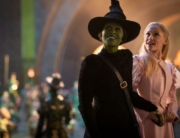A common lack of awareness about the insidious nature of mental illness—not to mention the irrevocable pain it inflicts upon those affected by it—contributes to the topic’s uneasy discourse. The general thinking seems to be that, because it’s not a perceptively physical disease, it must therefore be “all in his/her/my head.” In Lenny Abrahamson’s Frank, this misguided notion is taken quite literally, and its outcome is revelatory, indeed.
Frank stars Michael Fassbender as the titular musician, who is either a euphonic prodigy or a recovering mental patient. At least, that’s the superficial diagnosis made by our narrator, mediocre keyboardist and substandard lyricist Jon (Domhnall Gleeson). But the film is quick to upend his summation and ask: Why can’t Frank be both and more?
By a fluke of good timing, Jon, a woebegone songwriter who still lives with his parents and feels indifferent toward most aspects of his provincial life, is offered a spot to join Frank’s ensemble after their pianist attempts to drown himself. Frank’s not-so-merry band of off-kilter accompanists includes exclusively French-speaking bassist Baraque (François Civil); predominantly speechless drummer Nana (Carla Azar); antsy, inept manager Don (Scoot McNairy); and Clara, Frank’s theremin-wielding, antagonistic sidekick, played to incisive aplomb by Maggie Gyllenhaal. They call themselves Soronprfbs, a name that no one seems to know (or care) how to pronounce. Each musician holds an emphatic torch for Frank, their leader, who just happens to spend his entire existence within the confines of a papier-mâché mask.
The film hinges on this device: Frank conceals his head within this more sizable, artificial one, and never, ever takes it off. He wears it while performing, eating, drinking, even showering, and his bandmates have nary seen Frank’s physical visage. As off-putting as this peculiarity might sound, those surrounding Frank are ardently endeared toward him. They see past his (literally) painted-on pretenses and admire the man behind the mask, a warm-hearted, unassuming lover of music. The band believes in his joyous musical passion, and to them, his idiosyncrasy is nothing more than an offbeat afterthought.
The mask, which looks like a post-adolescent version of the Big Boy Restaurants’ mascot, functions as a disconnection device. Viewers are meant to place Frank in an outsider box due to this bizarre quirk, presuming that he must be in some way deranged for making such a strange lifestyle choice. But in his mind, Frank is preventing the pain and dejection of the outside world from reaching him by protecting himself with pasted parchment. The mask also serves as a means by which Frank fashions a framework for strangers to discover his music and, in turn, praise his genius. He presents himself as an eccentric outcast and that’s why they love him.
As prescient as Frank’s act of defiance may outwardly seem, it also speaks to a more disquieting aspect of his decidedly unsound mentality. It’s here that the film discovers its deeper message. Though Frank appears to have beaten everyone to the punch by confining himself to his own box, fundamentally he is a man who suffers from a chemical imbalance. Whether he’s seeking acclaim or fending off rejection, ultimately his biggest battle is with his internal self.
Frank calls attention to the perils of mental illness in an accessible, impartial manner. By manifesting the disease in the form of a mask that Frank cannot remove, viewers are meant to see how truly all-consuming life with such an ailment can be. Abrahamson’s effectual direction presents an issue without resorting to easy sentimentality. Fassbender is striking, despite hiding his face. His subtle body language speaks volumes. And Gyllenhaal is frightening as a woman who exhibits the traditional traits of mental instability while playing into them as if her life were nothing but a piece of performance art.
If only the real mask of mental illness weren’t so indiscernible, maybe we could begin to effectively combat it. Alas, for now we have Frank, a film that stands firmly empowered by its own fragility without ever hiding away from it.







Leave A Comment